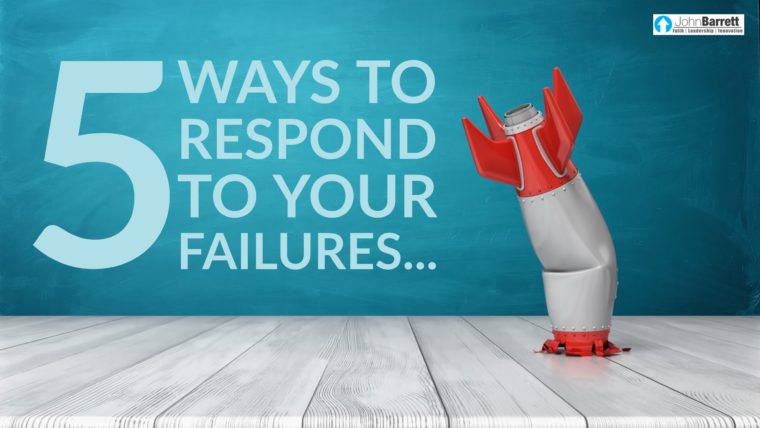
You’ve failed!
These two words were the most feared combination throughout school. In fact, I can remember having nightmares after graduating high school that I failed my classes and would never get out. These dreams haunted me for a few years even though I was done with grade school.
Growing up we are taught that failure is a very very bad thing. It is something to avoid at all cost. The greatest thing a young person fears is failure. Unfortunately, that fear follows us into adulthood as well. But fearing failure only limits our potential. I believed that all failure leads to the dark side…but I was wrong.
Failure has two sides to it. On one side it is dark and does lead to destruction. But the other side of it is productive and leads to a great lesson. Depending on which side you land on will determine what happens next. The good news is that you get to decide which side of failure you operate from.
The only way you truly fail is to not learn from your failure. Failure in and of itself is what it is, it’s what you do with it that makes you or breaks you. Failure doesn’t make you a failure unless you allow it to defeat you. But when you allow your failure to also be your teacher you’ll grow stronger from it. Failure doesn’t define you, it refines you. Without failure how would we ever know what not to do? A person who succeeds without failure is a myth. It doesn’t happen…at least not true success.
Here are 5 ways to respond to your failures:
1) Fail Humbly
Don’t hide, fight, or avoid failure. The moment you think you’re too good not to fail is the moment you set yourself up for disaster. Be humble when you fail. Admit your mistakes and shortcomings. It’s ok to be honest with yourself and others. If you can’t fail humbly, you won’t succeed humbly. Entitlement and greed overtake those who think they are better than they are. Humility unlocks the door to growth.
2) Fail Quickly
Better to fail small and fast than to avoid it and fail later when the stakes are higher. The faster you learn, the faster you can advance. And remember failure is a much better teacher than success. Don’t wait too long to get going in what you feel you need to do. Fearing failure causes paralysis. It keeps us from stepping out in faith. Better to learn as you go than to get so far down the road you have to go back and relearn what you never learned from the beginning.
3) Fail Curiously
Don’t get caught up in the emotion of failure. Be unaffectedly curious as you fail. Emotional debris can cloud your judgment in the midst of challenges. You have to remove your emotional attachment to the failure and objectively look at why the failure happened. Curiosity causes you to lean in and learn why whatever you did didn’t work. If you are angry, bitter, hurt, embarrassed, or skewed you’ll miss the lesson. Keep curiosity at the forefront of all that you do and you’ll become better as a result.
4) Fail Forwardly
Whenever you fail and take the time to reflect as to why you failed you’ll learn a lesson. But it’s not enough just to learn the lesson you then have to apply what you’ve learned in order to move forward. Failure should propel you forward eventually. It may initially be two steps back, but when done right will catapult you five steps forward. It’s how you apply what you’ve learned that will make the difference. Failing does nothing beneficial unless you intentionally change something as a result of it. Keep doing what you’ve always done and you’ll always get what you’ve always got. In order to change the outcome, you have to change something in the variables.
5) Fail Continuously
Most people assume success is a predetermined calculated formula, but rather it is more likely that someone tried something and it happened to work. For some reason, we have a mythical and somewhat magical thought that those who have attained success did so with a clear plan they never deviated from. But success rarely happens this way. It is usually the result of trial and error. And after many attempts, something actually broke through. Start to tinker around with new ideas, new systems, and new opportunities. Begin to think outside the box that you’ve always thought in. Don’t be afraid to fail as you venture out into new territory.
Change your outlook on failure and you’ll open up a whole new level of learning.







Please note: I reserve the right to delete comments that are offensive or off-topic.